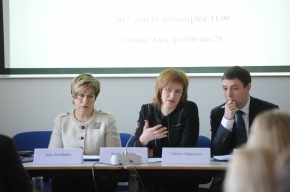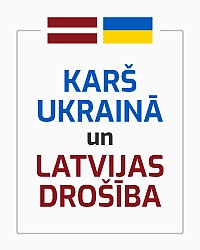 Galerija
Galerija
The European Union’s (EU) fiscal discipline treaty is a crucial step on the road to ensuring economic development in the EU and its global competitiveness. This was a key-point stressed by Zanda Kalniņa-Lukaševica, Chairperson of the European Affairs Committee of the Saeima, during the debate on the Treaty on Stability, Coordination and Governance in the Economic and Monetary Union: Content and Significance, which took place on Friday, 10 February.
The debate took place in the EU House and was organised by the European Affairs Committee of the Saeima in collaboration with the Ministry of Foreign Affairs and the European Commission Representation in Latvia in order to raise awareness about the Treaty, which has recently been supported in principal by 25 EU member states. The debate focused on the political context of the Treaty, its institutional significance, the fiscal instruments it provides and related legal issues.
“Fiscal stability has to be an important part of the solution for the current crisis. A balanced budget is a prerequisite for us to take the next most crucial step in overcoming the economic crisis — implement measures to strengthen solidarity, as well as facilitate sustainable growth and employment on the national and EU level,” the Chairperson of the Committee said at the debate.
Kalniņa-Lukaševica pointed out that the issue of overcoming the economic, financial and government debt crisis has been at the forefront of the EU agenda for the past two years. “Unfortunately, the European Union had not succeeded in showing substantial improvements so far. This Treaty is a step in the right direction to ensure the growth of the EU economy and its global competitiveness,” Kalniņa-Lukaševica said.
In analysing the content of the new Treaty, the Chairperson of the Committee emphasised its three most important aspects. She stressed that the Treaty recognises the rights of contracting parties which are currently outside the euro area to participate in discussions of Euro Summit meetings concerning competitiveness, the modification of the global architecture of the euro area and the fundamental rules that will apply to it in the future.
“This Treaty signifies understanding and support for comprehensive participation of non-euro area countries in Euro Summit meetings. The current format of these meetings creates the risk of the emergence of a two-level or two-speed Europe. Latvia will also have to do everything in its power to reduce this risk,” Kalniņa-Lukaševica stressed.
The second aspect which the Chairperson of the Committee highlighted was the Treaty’s provision for cooperation between the European Parliament and the national parliaments of EU member states. “As a national parliament, the Saeima greatly appreciates the provision of the Treaty which directly includes member state parliaments in discussions and the decision-making process.”
“Finally, the Treaty contains a new quantitative indicator — structural deficit. I see this as a crucial principle. I would like to emphasise that, in my opinion, from a systemic and content perspective this is the most important innovation,” Kalniņa-Lukaševica stressed.
The Treaty on Stability, Coordination and Governance in the Economic and Monetary Union provides for the strengthening of fiscal discipline and the improvement of economic governance within the euro area, as well as in the EU member states outside of the euro area which have chosen to join the Treaty partially. The Treaty aims to deter member states from developing outsized budget deficits and government debt. The member states undertake to maintain a balanced budget or a budget surplus; a budget deficit is permissible only in extraordinary circumstances.
The Treaty stipulates that countries not adhering to the fiscal discipline will have to put in place a budgetary and economic partnership programme which includes a detailed description of structural reforms. The Court of Justice of the European Union will have the right to verify whether a member state has transposed the balanced budget rule and mechanism into its national legislation. If a member state fails to comply with the judgment of the Court of Justice, the Court will have the right to impose upon the offending party a penalty payment appropriate in the circumstances.
Saeima Press Service









